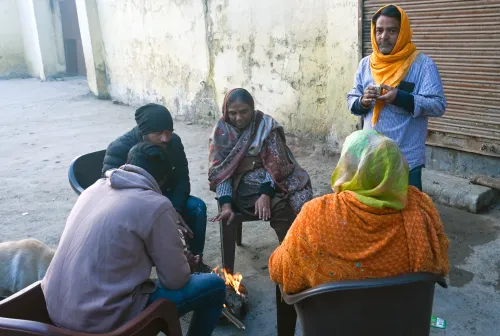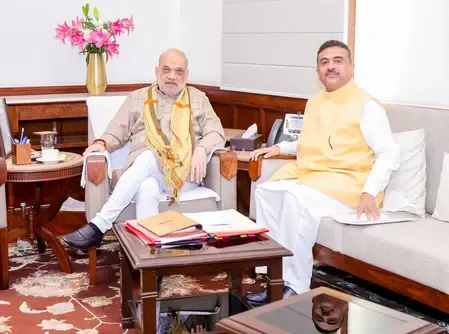Debate Over Mohammed Shami's Fasting: Muslim Scholars Divided on Ramzan Observance

Synopsis
Key Takeaways
- Division among clerics over Shami's fasting choice.
- Criticism from cleric Ibrahim Chaudhary.
- Support from Maulana Qari Ishaq Gora.
- Debate extends beyond religious leaders.
- Importance of understanding individual circumstances.
New Delhi, March 6 (NationPress) A new debate has surfaced regarding Indian cricketer Mohammed Shami’s choice to abstain from fasting during the current month of Ramzan. This situation has led to a rift among Muslim clerics and scholars, with some criticizing his decision while others adopt a more understanding stance grounded in Islamic teachings.
A recent video circulated on social media showcased Mohammed Shami drinking water during India's semi-final match against Australia.
The backlash originated from Muslim cleric Ibrahim Chaudhary, who voiced his dissatisfaction with Shami’s public behavior during the holy month of Ramzan. He questioned Shami’s dedication to his religious obligations, especially the practice of fasting throughout this sacred period.
Chaudhary branded Shami a sinner for purportedly violating the fast during the semi-final match against Australia, which occurred during Ramzan.
He underscored that observing the fast during Ramzan is a farz (mandatory) act in Islam, which every Muslim is required to uphold.
"It is crucial to adhere to all Islamic duties as commanded by Allah. If any Muslim intentionally neglects or skips these responsibilities, particularly when they are capable of fulfilling them, they are committing a sin," stated Chaudhary.
He further explained that Islam advocates complete adherence to its commandments, and success can only be achieved by following all of them.
Chaudhary asserted that if Shami’s actions were intentional, he risks forfeiting the rewards associated with fulfilling religious obligations.
In contrast, Muslim scholar Maulana Qari Ishaq Gora defended Shami by presenting a more nuanced view. Gora recognized that fasting during Ramzan is indeed a central duty for Muslims but highlighted that Islam allows for certain exceptions under compelling circumstances.
"If an individual is unable to fast due to unavoidable reasons, such as being a professional athlete, Islam permits breaking the fast. The pivotal aspect is that the justification must align with Shariat," said Gora.
He emphasized that outsiders should refrain from hastily judging the decision to break a fast.
"This matter is between Allah and Shami. There is no need for anyone to act as an arbiter in this situation," Gora added.
He also pointed out that if Shami’s actions were consistent with Shariat, harsh judgment should be avoided, as it is ultimately Allah who determines the repercussions of such actions.
The discussion extended beyond the religious sphere, with various public figures contributing their thoughts on the issue.
Pujya Swami Chidanand Saraswati, the President of Parmarth Niketan, provided a viewpoint focused on harmonizing religious practices with national service.
"There are individuals who, due to their unique circumstances, may not observe Rozah, but that does not imply a loss of faith. They may express their devotion through alternative means, including their commitment to the nation. This too is a form of worship," he remarked.
He acknowledged that patriotism, dedication to one's duties, and selflessness for the country can also be seen as acts of devotion, equally significant in the eyes of the divine.
"Contributing to national progress, sacrificing time and effort for the welfare of the country, is no less than an act of worship. We must honor these efforts just as we respect those who adhere to religious rituals," he concluded.










